19th Century
Category: Other
Updated: 10 Feb 2018
Contributors
Created byRafelle Marie Timog Allego
Attachments
Events
Italian Alessandro Volta makes the first battery (known as a Voltaic pile)Joseph-Marie Jacquard invents the automated cloth-weaving loom. The punched cards it uses to store patterns help to inspire programmable computersHenry and Sealy Fourdrinier develop the papermaking machineHumphry Davy develops electrolysis into an important chemical technique and uses it to identify a number of new elementsHumphry Davy develops the electric arc lampGeorge Stephenson builds the first practical steam locomotiveRobert Stirling invents the efficient Stirling engineJoseph Niepce makes the first modern photographWilliam Sturgeon develops the first practical electric motorLouis Daguerre invents a practical method of taking pin-sharp photographs called DaguerreotypesWilliam Henry Fox Talbot develops a way of making and printing photographs using reverse images called negativesEnglishman Francis Petit-Smith and Swedish-American John Ericsson independently develop propellers with blades for shipsCharles Goodyear finally perfects a durable form of rubber (vulcanized rubber) after many years of unsuccessful experimentingScottish physicist James Prescott Joule outlines the theory of the conservation of energyScotsman Alexander Bain invents a primitive fax machine based on chemical technologyJames Francis invents a water turbine now used in many of the world's hydropower plantsHenry Bessemer pioneers a new method of making steel in large quantitiesLouis Pasteur develops pasteurization: a way of preserving food by heating it to kill off bacteriaItalian Giovanni Caselli develops a mechanical fax machine called the pantelegraphFrenchman Étienne Lenoir and German Nikolaus Otto pioneer the internal combustion engineJames Clerk Maxwell figures out that radio waves must exist and sets out basic laws of electromagnetismFire extinguishers are inventedElisha Graves Otis invents the elevator with built-in safety brakeJoseph Monier invents reinforced concreteChristopher Latham Sholes invents the modern typewriter and QWERTY keyboardAlexander Graham Bell patents the telephone, though the true ownership of the invention remains controversial even todayThomas Edison develops the phonograph, the first practical method of recording and playing back sound on metal foilLester Pelton invents a useful new kind of water turbine known as a Pelton wheelThomas Edison invents his sound-recording machine or phonograph—a forerunner of the record player and CD playerEdward Very invents the flare gun (Very pistol) for sending distress flares at seaThomas Edison patents the modern incandescent electric lampPierre and Paul-Jacques Curie discover the piezoelectric effectThomas Edison opens the world's first power plantsCharles Chamberland invents the autoclave (steam sterilizing machine)Charles and Julia Hall and Paul Heroult independently develop an affordable way of making aluminumCarrie Everson invents new ways of mining silver, gold, and copperJacques d'Arsonval suggests heat energy could be extracted from the oceansCharles Eastman invents plastic photographic filmCharles Parsons develops the steam turbineKarl Benz builds a gasoline-engined carKarl Benz builds a gasoline-engined carFriedrich Reinitzer discovers liquid crystalsJohn Boyd Dunlop patents air-filled (pneumatic) tiresNikola Tesla patents the alternating current (AC) electric induction motor and, in opposition to Thomas Edison, becomes a staunch advocate of AC powerEverett F. Morse invents the optical pyrometer for measuring temperatures at a safe distanceFrench brothers Joseph and Louis Lumiere invent movie projectors and open the first movie theaterGerman engineer Rudolf Diesel develops his diesel engine—a more efficient internal combustion engine without a sparking plugGerman physicist Wilhelm Röntgen discovers X-raysAmerican Ogden Bolton, Jr. invents the electric bicyclePeriods
Michael Faraday builds primitive electric generators and motorsCharles Wheatstone and William Cooke, in England, and Samuel Morse, in the United States, develop the electric telegraph (a forerunner of the telephone)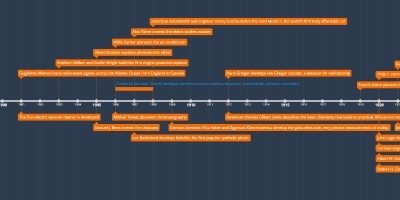
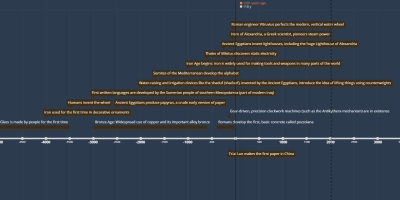
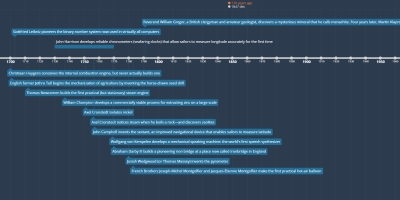
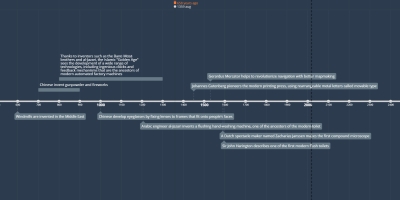
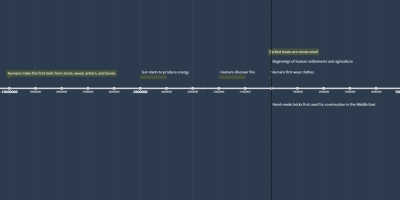
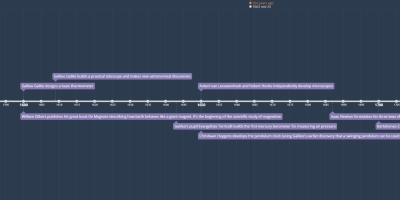
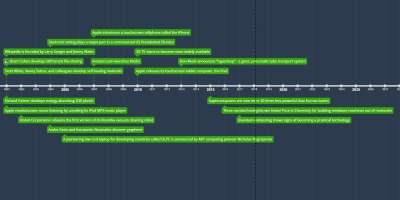
Comments